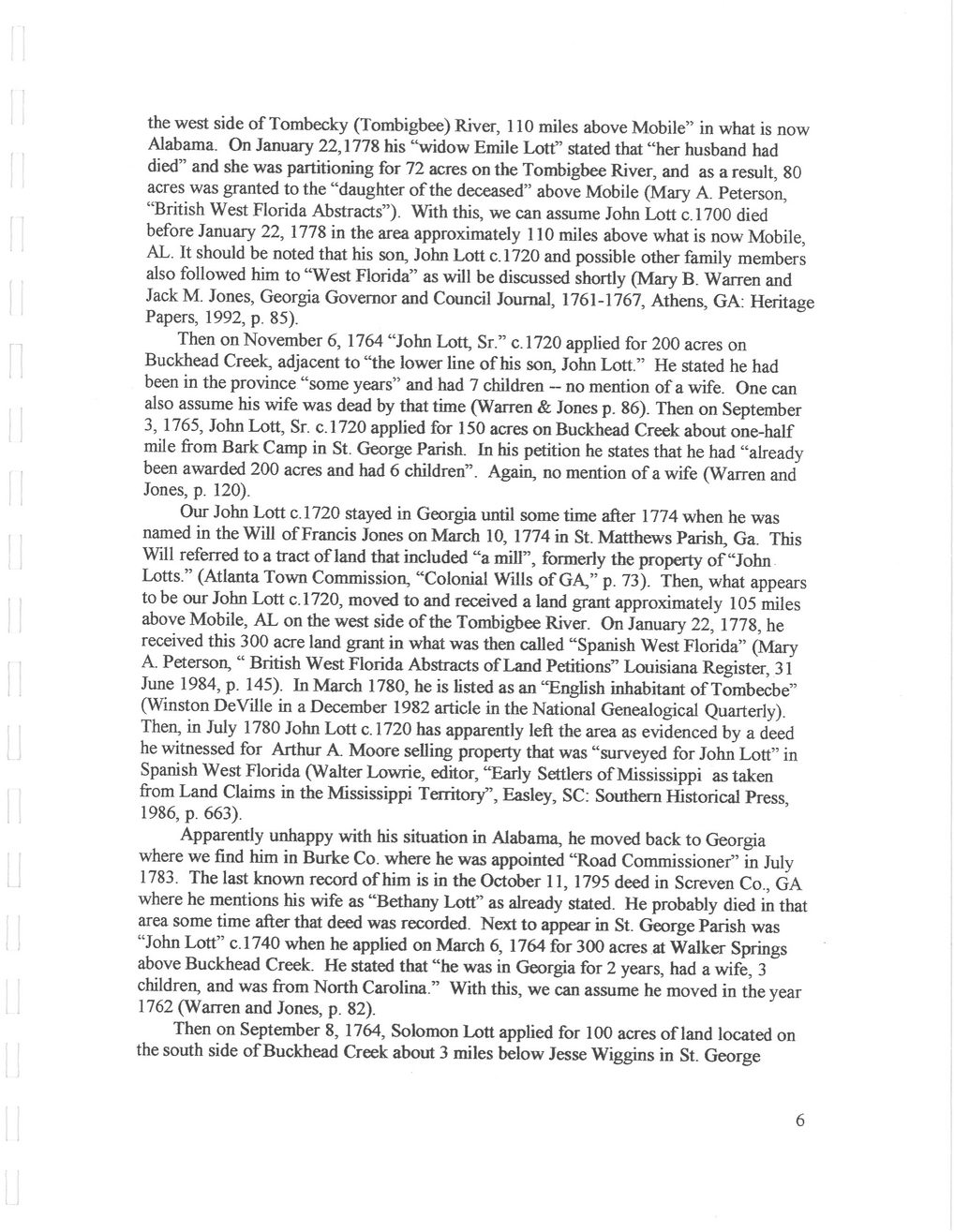This text was obtained via automated optical character recognition.
It has not been edited and may therefore contain several errors.
the west side of Tombecky (Tombigbee) River, 110 miles above Mobile” in what is now Alabama. On January 22,1778 his “widow Emile Lott” stated that “her husband had died” and she was partitioning for 72 acres on the Tombigbee River, and as a result, 80 acres was granted to the “daughter of the deceased” above Mobile (Mary A. Peterson, “British West Florida Abstracts”). With this, we can assume John Lott c.1700 died before January 22, 1778 in the area approximately 110 miles above what is now Mobile, AL. It should be noted that his son, John Lott c.1720 and possible other family members also followed him to “West Florida” as will be discussed shortly (Mary B. Warren and Jack M. Jones, Georgia Governor and Council Journal, 1761-1767, Athens, GA: Heritage Papers, 1992, p. 85). Then on November 6, 1764 “John Lott, Sr.” c. 1720 applied for 200 acres on Buckhead Creek, adjacent to “the lower line of his son, John Lott.” He stated he had been in the province “some years” and had 7 children — no mention of a wife. One can also assume his wife was dead by that time (Warren & Jones p. 86). Then on September 3, 1765, John Lott, Sr. c.1720 applied for 150 acres on Buckhead Creek about one-half mile from Bark Camp in St. George Parish. In his petition he states that he had “already been awarded 200 acres and had 6 children”. Again, no mention of a wife (Warren and Jones, p. 120). Our John Lott c.1720 stayed in Georgia until some time after 1774 when he was named in the Will of Francis Jones on March 10, 1774 in St. Matthews Parish, Ga. This Will referred to a tract of land that included “a mill”, formerly the property of “John Lotts.” (Atlanta Town Commission, “Colonial Wills of GA,” p. 73). Then, what appears to be our John Lott c.1720, moved to and received a land grant approximately 105 miles above Mobile, AL on the west side of the Tombigbee River. On January 22, 1778, he received this 300 acre land grant in what was then called “Spanish West Florida” (Mary A. Peterson, “ British West Florida Abstracts of Land Petitions” Louisiana Register, 31 June 1984, p. 145). In March 1780, he is listed as an “English inhabitant of Tombecbe” (Winston DeVille in a December 1982 article in the National Genealogical Quarterly). Then, in July 1780 John Lott c. 1720 has apparently left the area as evidenced by a deed he witnessed for Arthur A. Moore selling property that was “surveyed for John Lott” in Spanish West Florida (Walter Lowrie, editor, “Early Settlers of Mississippi as taken from Land Claims in the Mississippi Territory”, Easley, SC: Southern Historical Press, 1986, p. 663). Apparently unhappy with his situation in Alabama, he moved back to Georgia where we find him in Burke Co. where he was appointed “Road Commissioner” in July 1783. The last known record of him is in the October 11, 1795 deed in Screven Co., GA where he mentions his wife as “Bethany Lott” as already stated. He probably died in that area some time after that deed was recorded. Next to appear in St. George Parish was “John Lott” c.1740 when he applied on March 6, 1764 for 300 acres at Walker Springs above Buckhead Creek. He stated that “he was in Georgia for 2 years, had a wife, 3 children, and was from North Carolina.” With this, we can assume he moved in the year 1762 (Warren and Jones, p. 82). Then on September 8, 1764, Solomon Lott applied for 100 acres of land located on the south side of Buckhead Creek about 3 miles below Jesse Wiggins in St. George 6

Lott Family Solomon-Lott-of-Hancock-County-MS-Ancestors-and-Descendants-07